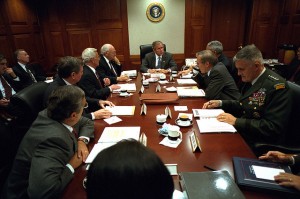
The U.S. National Security Apparatus will simulate the interconnectedness of real life decision-making on international security
In the spring of 2011, Secretary-General Taylor Wettach had an idea for an entirely new organ at NAIMUN XLIX that would examine a subject that typically goes somewhat under-examined in the world of Model UN—the United States National Security Apparatus. Never before has NAIMUN sought to create such a comprehensive focus on US national security, or to develop crisis connections between more than just two committees.
Secretary-General Taylor Wettach believed that such a focus would be ideal for NAIMUN, with its Washington, DC location and tradition of drawing speakers experienced in US foreign policy. The NAIMUN XLIX Secretariat decided to situate the US National Security Apparatus in 2002, near the beginning of the “war on terror.” This period was a time of great crisis and opportunity for the United States—a time in which a select few foreign policy events would come to define the next decade of American politics, both at home and abroad.
The US National Security Apparatus features committees that examine American security from a military aspect (US Central Command), a political perspective (US Senate), a diplomatic perspective (US State Department), an intelligence and espionage perspective (US Intelligence Community), and from the perspective of the executive branch (US National Security Council). These committees will all interact in a host of multifaceted ways, working to respond to a variety of situations during an intense four-day simulation. While this undoubtedly will prove no easy feat for USG Arun Avva and dUSG Sam Brothers, the final result will provide delegates with a great insight into US foreign policy.
In the modern day and age, America confronts challenges that require multi-faceted responses, and NAIMUN’s newest organ allows delegates to explore this reality from a variety of governmental positions. The US National Security Apparatus takes delegates beyond the micro level of a single committee view to demonstrate that foreign policy relies on a variety of actors and institutions working together to craft an appropriate response. The NAIMUN Secretariat is excited to see how delegates will respond to this challenge, and to see how even just the slightest changes in decisions could have gone on to affect history in potentially enormous ways.


